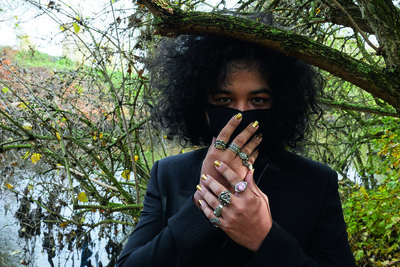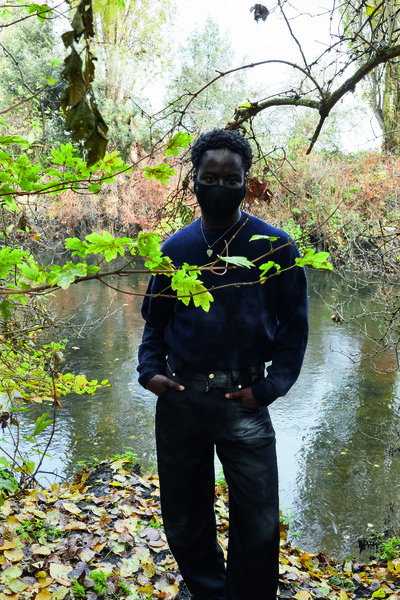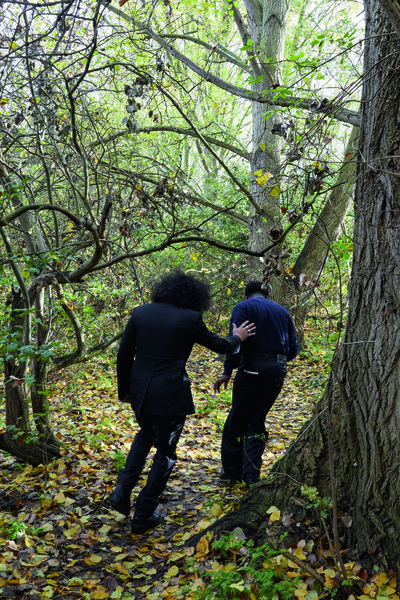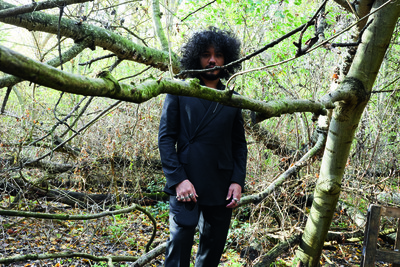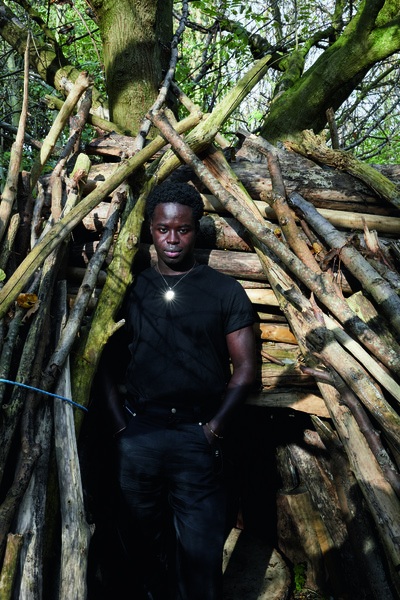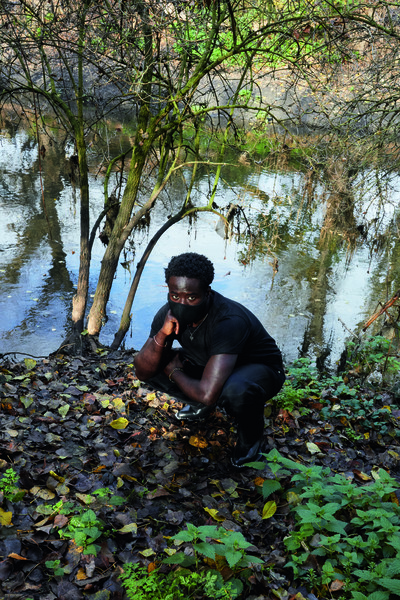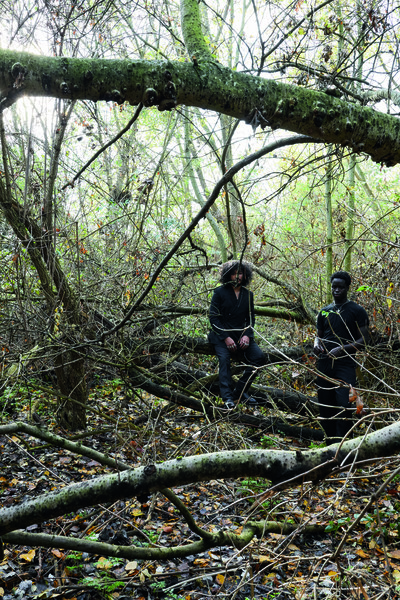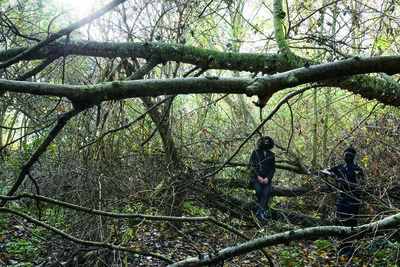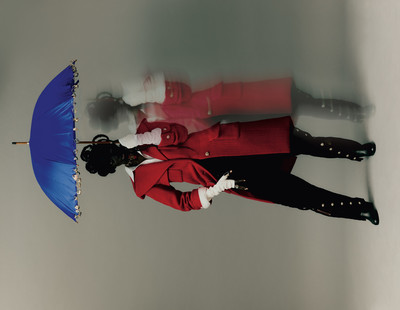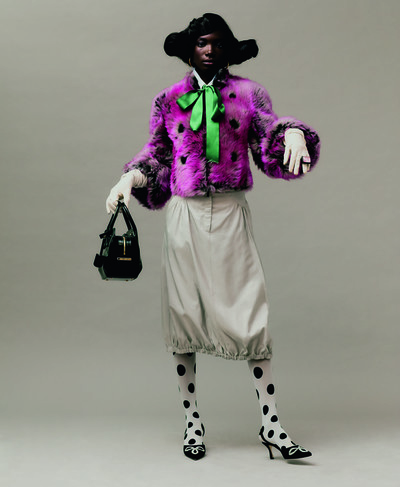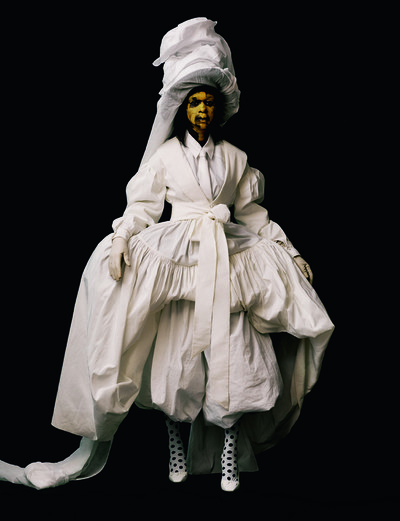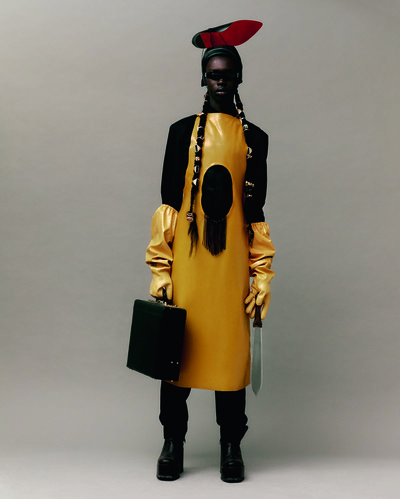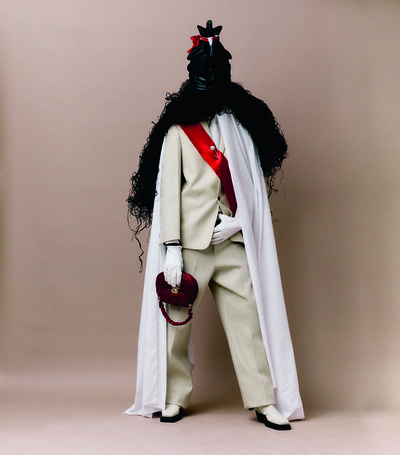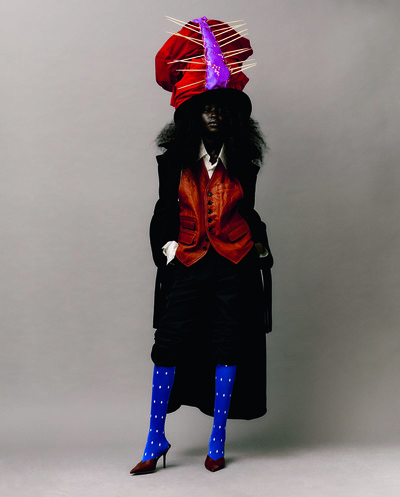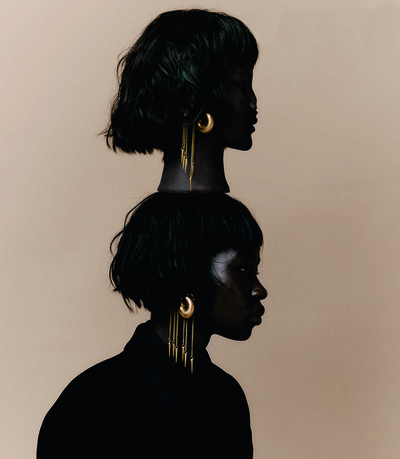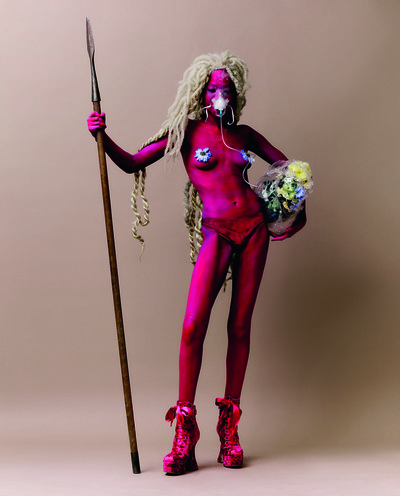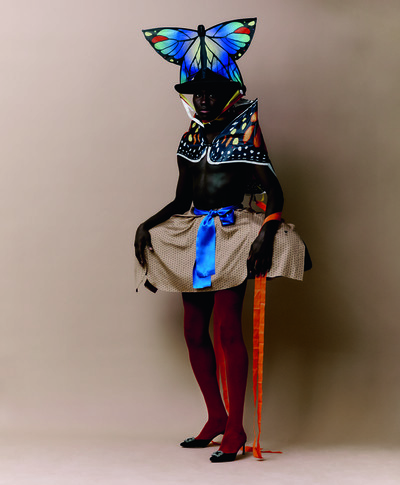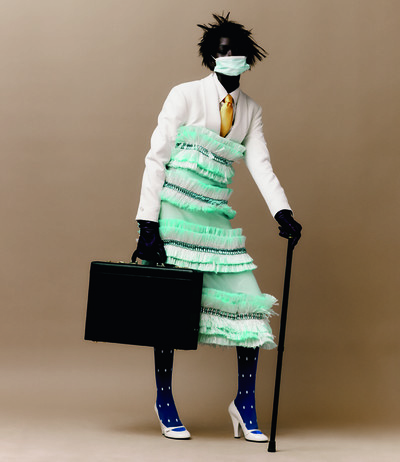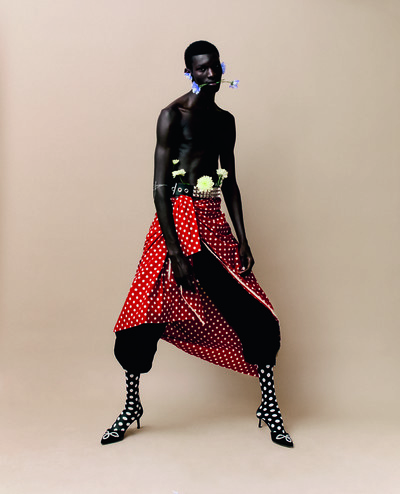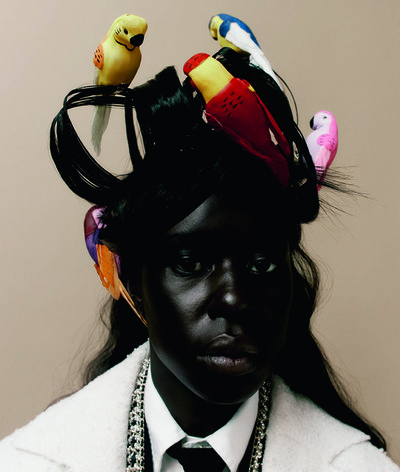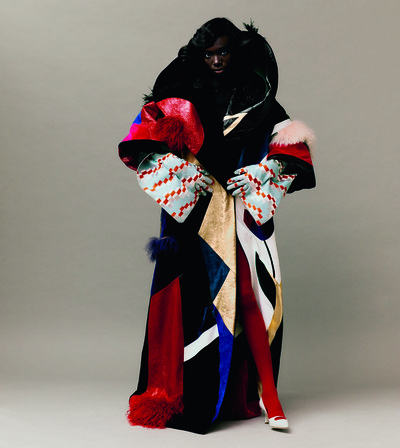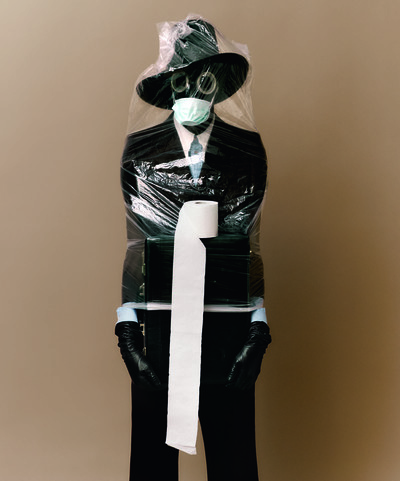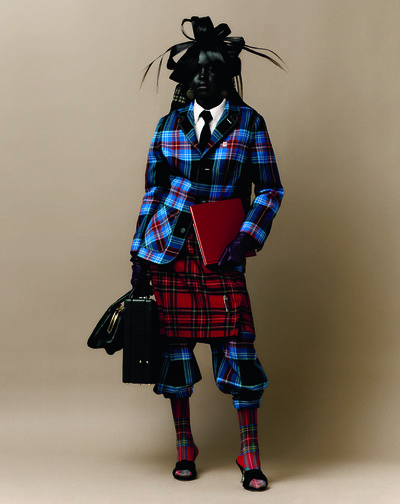Stylist Ibrahim Kamara and photographer Rafael Pavarotti are creating a new fashion image-making vernacular.
Text and interview by Rana Toofanian
Portraits by Juergen Teller
Creative partner Dovile Drizyte
Stylist Ibrahim Kamara and photographer Rafael Pavarotti are creating a new fashion image-making vernacular.

It is perhaps no surprise that stylist Ibrahim Kamara and photographer Rafael Pavarotti should emerge as two of the most compelling voices in fashion image-making in a year so unrelentingly focused on reality. A year whose events have forced many around the globe and in the fashion industry into a fierce examination of past, present and future. Their increasingly sought-after collaborative lens is based upon a shared desire to harness fashion and fantasy to explore new ways of seeing the world. In their arresting fictional panoramas, every frame, character, look and symbol acts like a prism refracting social and cultural issues.
Although the duo hails from different continents – Kamara from Freetown, Sierra Leone, and Pavarotti from Belém, a city on the edge of the Amazon rainforest – their creative partnership, which began back in 2018, has always felt intuitive. Kamara first contacted Pavarotti on Instagram after coming across a shoot the photographer had done for Vogue Brasil: ‘I just saw myself in Raf’s world. His pictures reminded me of home.’ Shortly after, Kamara journeyed the six thousand miles to meet Pavarotti for a series of shoots focused on Black and indigenous culture in Brazil. That initial encounter marked the photographer’s first return to his Amazonian homeland in 10 years and the resulting body of work – which featured Pavarotti’s family, childhood friends and community – set the paradigm for their rich, distinctive brand of image-making: a powerful alliance centred on an unequivocal embrace of their respective cultures, histories and experiences.
Today, having transcended obstacles of geography – Pavarotti recently moved to London and now lives near Kamara – and language – ‘we have never let language stop the way we communicate; we don’t need an interpreter to hang out’ – they continue to bring to life worlds, characters and stories that reach far beyond the pages of the magazines in which they are published. They remain steadfast in their vision to cultivate a new language for a new era. ‘What we are doing today is creating a legacy for the next generation,’ says Pavarotti. ‘It’s a blueprint for a new world order. It’s a shared dream.’
Rana Toofanian: Let’s start at the beginning. Ib, you first reached out to Raf on Instagram back in 2018. What was it about his work that resonated with you?
Ibrahim Kamara: I just loved Raf’s world. I saw myself in it. The photograph of the girl dancing with the drum [in Pavarotti’s 2017 Vogue Brasil editorial] – reminded me of home. That picture represents my childhood, too. If there is one thing we are known for in West Africa, it is partying. Where I grew up in Sierra Leone, we also have parades, like carnival in Brazil, and all these lanterns go through the streets, and people dance. It is a massive celebration. So, when I saw Rafael’s photo, it resonated with me. It instantly brought back memories of experiences I had lived in Sierra Leone and in Gambia. It felt like our worlds were colliding – and I just knew I wanted to work with him.
What was your opening gambit, Ib?
Ibrahim: ‘Hey! I love your work so much, bye!’ [Laughs] I am quite shy when I reach out to people!
Rafael Pavarotti: That was it! I was very shy, too. I just responded: ‘Oh my gosh! I love your work too!’ Later on, I thought to myself, ‘What do I say to Ibrahim Kamara?’
Raf, how familiar were you with Ib’s work at that time?
Rafael: In 2017, I was at lunch with a friend who introduced me to Ib’s work; what he was doing was already a huge reference for Black culture and youth in Brazil at the time. I was living in São Paulo then. It was a moment when things were really coming together in Brazil – in terms of fashion and art – everyone was showing their faces and finding spaces. Ib’s work had the same effect on me. I saw myself in it, and I knew that it was important.
What was it like the first time you met in real life?
Ibrahim: I travelled to Brazil specifically to photograph two stories with Raf for i-D and Double. It is really insane, travelling to the other side of the world to meet someone for the first time, and within the first few hours, the first few minutes even, you just get on! It was electric. We just started laughing. It was like little children coming to play for the first time. There was just this instant trust and connection.
How did that trust manifest itself?
Ibrahim: I just jumped on the back of a very speedy motorbike with Raf and off we went. It was crazy; I would never have done that in my whole time in Sierra Leone! In England, it’s all ‘health and safety’, but all of that just went out of the window when I met him in Belém. It was so liberating.
Was there a language barrier?
Rafael: From the moment we met, it was as if we had already known each other for years. Our friendship and complicity just makes it easy for us to understand one another. We are present in each other’s company without fear or shame.
Ibrahim: We have never let language stop the way we communicate. We always just find a way to get it and to understand. [To Raf] I don’t need an interpreter to hang out with you. We can hang out with no one else there, and we can just talk, and talk and talk and laugh! I think we really understand each other because it is the language of love and creativity and it’s pure.
Raf, that first shoot with Ib also signalled your first time back home to Belém in a decade. How was that experience for you?
Rafael: Once I got out of my hometown, I went away for many long stretches. There was a period where I felt really hurt. I had doubts about life and the industry. Around the time I met Ib, I was on a spiritual journey, where I was healing, and falling in love with who I was and where I was from. When Ibrahim said, ‘Let’s shoot the people you love!’ I knew Belém was where we had to go. Returning home represented the beginning of a new era for me – one where I was looking into myself, and into things that were a part of me. We photographed my mother, my neighbour, my friends and everyone who raised me. It was this magical moment. Everything seems very different after that.
That’s quite an intimate way to meet and work together for the first time. Ib, how do you feel that experience informed your creative partnership with Raf?
Ibrahim: Rafael was very generous and hospitable. I saw he loved life; he loved to laugh, and dance. We have a lot of similarities, because I love life, too. I love people. In Sierra Leone, the community is very generous. We all share with one another. We all dance and celebrate together. That’s what I got from being in Belém; it’s a very celebratory place. They are all very proud of who they are there. Working with Rafael and all the people he loves felt so natural – as if I was back home in Freetown. I don’t know how else I can put it. I just immersed myself into his world and experienced everything he experiences, which is very similar to my own upbringing, and that was the most beautiful connection for me, because that really helped shape our work.
‘I just jumped on the back of a very speedy motorbike with Raf and off we went. It was crazy; I would never have done that in Sierra Leone!’
Raf, you also travelled to Ib’s hometown earlier this year to shoot a story on youth culture in Sierra Leone for i-D.
Ibrahim: [To Raf] I still can’t believe you came to Freetown! It’s crazy. I will let Raf speak.
Rafael: Working on that project in Freetown with Ib, being there with someone I love, with my brother, and witnessing how it was all connected, where everything came from – that was a really powerful experience.
One of the things reflected in your work, but also in observing you as friends and creative collaborators, is how deeply you embrace each other’s respective cultures, histories and experiences.
Rafael: It’s a celebration of both our similarities and our differences.
Ibrahim: It’s really rare to meet and work with people who you share such an intimate connection with. We have a pure respect for each other’s backgrounds, even though I am from West Africa and Raf is from the Amazon. We have really similar experiences and backgrounds. I have lived things that he has been through and vice versa. We both live in the West now, but we have both dreamed of where our lives could take us. We always find a middle ground to connect both of our worlds – a shared vision, a shared anger, a shared love, a shared question.
Rafael: A shared dream. That’s something that has really connected us from the beginning: dreams. They are not just our dreams, but the dreams of our generation, of those who want to change the world. When I was growing up and got into photography, I had no references, and that shapes you in a very strange way. Whenever I am working with Ib, I think about my younger brother, my cousins and all the kids around us. Sometimes you receive messages from amazing young boys and girls from all over the world thanking you for the work you’re doing or for giving them someone to look up to. I got one from a girl in Nepal. How beautiful it is that a message can travel this way? What we create reflects our reality and our dreams. We’re just sharing it in this space called ‘fashion’. It might not be to everyone’s taste, but it’s what we have lived, are living and hope to live one day.
Ibrahim: I also grew up with imagery that wasn’t mine, that I couldn’t reference. It spoke to me and I appreciated the beauty in the work, but I didn’t see myself in it. There is a beauty in being able to create images that you see yourself in. Can you imagine if it was balanced? How empowering that would be to all the kids around the world. Our work is not about Blackness, it is beyond that, it’s a celebration of beauty. I want people to see our work and be blown away by the vision, by the beauty in it. I hope it eventually becomes normal for everyone in the world to consume it like that, to look past whatever prejudice they have and just celebrate its beauty. For me, being in this space is about creating new references and educational content. If what we create empowers and inspires people two generations on from now, then I think we will have done our job. It’s not about glory or gains, it’s about wanting the images to be important.
How does the process of creating a new body of work together begin?
Rafael: We have the same energy, whether we are working together or chilling at home. We’re always enjoying ourselves; we’re always creating together. For me, it feels as if we have a very spontaneous, free way of doing things, which I think comes from being in a constant dialogue. Anything can serve as inspiration in our work: a memory, a song, a film. When we decide that we want to create something new, we find that we are just capturing everything that’s around us at that point in time. It’s almost mystical – as if the messages and ideas are delivered to us. As Ib has said, it’s as if the narratives and characters are just manifesting in reality.
Ibrahim: At this point, it feels as if we’ve built a world together, so when it comes down to producing something new, things come very naturally, because it’s an extension of the world and language that we’ve established. Of course, there is still a lot of research and sketching that goes into what we create, but when we are in the studio, it feels very natural to be making the work. That’s the best way I can explain it.
Rafael: There are many ways of seeing: there is a way of seeing through the eyes and a way of seeing through the heart.
‘People might be shocked by some of the props and subjects that feature in our work. The guns are a part of Raf’s world and also a part of mine.’
The characters and narratives you imagine for each story are always new, but part of what sustains your world is a number of recurring motifs and props.
Ibrahim: It’s not so much about the motifs specifically anymore; they are really just a part of a shared language. Some people might be shocked by some of the props and subjects that feature in our work. I wouldn’t use them with anyone else. They are based on a shared experience you have to have in order to create certain things. The guns – which we first used in Belém – are a part of Raf’s world and also a part of mine; that’s why it’s OK for us to use them as part of our world. If anything, the guns are not there to provoke, but to defend. It’s about standing your ground and fighting back; that’s it. For some- one to think about our work as simply shocking or provocative would be a dis- appointment to me. To be shocking is boring, I am not interested in that. The guns are not a part of an aesthetic that can be replicated. It’s something that you have either lived or haven’t. They are there to make people stop and question their presence within the image.
Rafael: Even if you come from a place where you might find the presence of these weapons shocking, once you come to know the things that I know about Brazilian reality, they will not shock you any more. How many times did I see someone with a gun? This is something that I have witnessed.
Ibrahim: The characters we created in this portfolio are a bit fucked up and intense: there’s this character of a king carrying a gun and a spear; it’s so confusing, but somehow it all makes sense. We’re living in such a tense time right now and that tension and confusion is reflected in that image for me.
Is there one image from this portfolio that you feel really expresses the moment we’re in?
Ibrahim: There are a lot. For me, the photo of the nurse, is the most important one we made during this project. It’s crazy that no one has spoken about that. Forget the styling. Forget the photography. The message is so strong for me in that picture. If you cannot comment on what is happening in 2020, are you for real? What year did you really live in? We are reflecting and dreaming about a lot things in this portfolio, but when you come to that image it represents a woman who saved the world. That picture represents my mother who is a nurse, and your mother, Raf, and all the immigrant mothers who do the work in 2020; all the Black and indigenous workers in hospitals around the world who are low-paid and mistreated. For me, image-making is about story-telling. It’s not really my responsibility to shoot all the beautiful gowns in the world – that was not why I was born into this world. I didn’t see gowns when I was young. I saw beautiful women who were married and had affairs with other men; for me, that is the kind of woman I want to dress. Not a woman, in a gown, in a studio, with no character or point of view. I get bored so easily if my mind is not being stimulated or I don’t relate to something. If there’s no story, I’m not interested and it doesn’t make sense.
In what ways do you feel your creative partnership has evolved and how is that reflected in the work you are making today?
Ibrahim: I think we are very confident in the work we are making right now. Neither Raf nor I are from the ‘elite’ of this world. We both come from poor backgrounds and our parents had to struggle to get us an education. We are from nothing and yet we are so confident. We are both grown now and have really come to love ourselves. There are some days I don’t look in the mirror any more because I have reached an age where I am secure in my look and what I can bring to the table. As Nina Simone said, ‘Freedom is no fear.’ That’s how it felt when we worked on this portfolio: we had no fear. Our ideas were very unfiltered. It was our world. With Rafael, it’s just us making our mistakes, correcting our mistakes. I never take it personally if Raf’s not into something; I only think about how I can make it better. It’s actually shocking how much you can come up with when you’re in an environment where there is no fear or controlling power. It’s so freeing.
Rafael: The complete absence of fear allows us to be so in sync, and gives us the freedom and trust to push it as far as we want. Without fear, there is only space left to dream endlessly. When we made this portfolio, it was like being away on summer camp. We didn’t rush it; we took our time. We thought about how real we wanted this story to feel. We gave so much attention and love to each model, and developed a light to bring each character we photographed to life.
Ibrahim: Raf, I’ve never seen you take that long to take a picture before. I was really stunned because you really took your time, just slipping into your little world. It was great because it gave me time to think. We were uninterrupted. No one was telling us we only had 20 minutes between each photo. I personally love to collaborate. I don’t believe one person can make a picture. It would be crazy for me to say – ‘Oh, I styled it!’ – about our work. I think it is a true collaboration. The styling and the photography are a conversation. Everything is shared and I think that shows in the work. As a creative, you get to work with so many people all the time, but do you ever really stop and create a connection? I think that’s what comes from finding someone with whom you also share similar values. I have so much trust in you, Raf. I never question your photography or your taste. I only trust you to make the most incredible things. There is no doubt for a second in my mind.
Rafael: There is always a moment when we look at each other and we just know that we have it.
What does the future look like for you both?
Rafael: We can’t talk about the future because the future does not exist. Here we are talking, looking at each other, now. Each time Ib and I make something it reflects the current state of the world. Each time, we dream up something together and then make something real. It can never be duplicated. It’s a mystery that we can talk about for hours, but never solve. How did we get here? It’s just something that we have to be in and enjoy.
Ibrahim: You are right. In a way, it is almost useless to speak about the future because you really don’t know what will happen. But it is always important to dream.
Rafael: Yes, let’s keep dreaming together.
‘Your dreams are my dreams.’
Photography by Rafael Pavarotti
Styling by Ibrahim Kamara
‘Even though we are from different parts of the world –
we have both dreamed of where our lives could take us.
This is our world.
What we create is what we are living right now.
It is everything all at once.
A shared love, a shared anger, a shared question, a shared vision.
A blueprint for a new world order.
There is no fear or controlling power –
only the freedom and energy to conceive and express what we want.
How do we put words to it? When it all just makes sense.
Your dreams are my dreams.’
Ibrahim Kamara and Rafael Pavarotti
